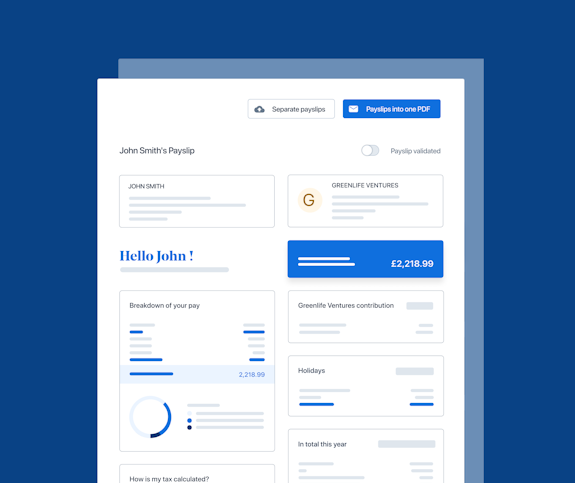- Blog
- |Managing Payroll
- >Payroll legislation
- >2024 Spring Budget announcements
Spring Budget 2024: Key Announcements for UK Businesses


The unveiling of the 2024 Spring Budget means Spring has officially sprung here in the UK, that is for us payroll enthusiasts...
Chancellor Jeremy Hunt was back, brandishing that famous red box in front of Number 11 before setting out to share plans for the UK public finances.
As far as Spring Budgets go, this was a pretty uneventful one, though that might come as some relief for busy payroll and HR professionals still catching up with recent changes.
Indeed, the announcements in support of businesses were surprisingly sparse, though workers will see a nice boost to income from that highly anticipated 2p cut to National Insurance, which we can confirm will go ahead. Some of the top changes for businesses to be aware of include:
An additional 2p cut to the National Insurance rate
The raising of the High Income Child Benefit Charge threshold
The announcement about six investment zones
Future plans to consolidate small pension pots
An additional tax administration and maintenance day
Besides these, limited fiscal headroom means there are few other announcements to cover, though Payroll, Finance and HR teams will still want to get up to speed with items like the new HICBC threshold.
Five changes announced during the 2024 Spring Budget for UK businesses
Let’s recap the five most significant announcements made during the budget that are sure to impact companies.
National insurance rate cut by 2%
This wasn’t exactly the government’s best-kept secret. Before Hunt took to the podium, there were many rumours swirling around about it. All that speculation proved to be correct.
At the very end of his speech, the Chancellor confirmed there would be an additional 2p reduction of employee’s National Insurance (NI) - taking the main rate from 10% to 8% for those of us who are employed.
The new rate will take effect on the 6th of April, 2024, the start of the new tax year. And, while this means more money in the pockets of employees, payroll software developers will have an extremely tight turnaround to implement this change.
Coming off the back of the cut to NI in January means there’s more work for HR and Finance teams to do. And let’s not forget payroll providers, particularly those whose systems are still desktop-based. This leaves little time for such providers to test these changes before the next payday.
Still, this could be a welcome change for employees during an ongoing Cost-of-Living Crisis. That being said, those who make use of a salary sacrifice arrangement for pension contributions, childcare vouchers, or schemes like Cycle to Work will experience fewer NI savings due to these rates decreasing. This, in turn, might reduce the appeal of such schemes, though employers still stand to reap the benefits as their rates aren’t changing here.
PayFit Top Tip
One of the best ways to communicate the cut to NI with your employees is via their payslips. You can do so by adding a small message at the bottom (PayFit, for instance, makes this very easy to do).
High-Income Child Benefit Charge (HICBC) threshold raised
While not an immediate change, nor strictly related to payroll, Hunt also announced the government’s plans during the 2024 Spring Budget to radically reform the High Income Child Benefit Charge (HICBC).
This is sure to require some significant legislative work, so the change isn’t set to take place until April 2026. The government’s overall goal is to move the entire system to a household means-based test to determine eligibility, which will involve HMRC gathering additional information.
For now, the treasury plans to lift the threshold from £50,000 to £60,000 as well as increase the top-end taper from £60,000 to £80,000. It’s important to note, however, that these thresholds are based on the income of each parent and, therefore, stand to benefit dual-income households while excluding single parents. For example, a household with two working parents earning £49,000 each (so £98,000 in total) would benefit from this, but a single working parent earning £50,000 wouldn’t.
As we mentioned, while this process won’t directly impact payroll, it will impact employees who have chosen to sacrifice a portion of their salary. Historically, workers have used salary sacrifice to lessen the impact of this charge. In addition, they’ll usually pay into a tax-beneficial pension scheme.
At the same time, this policy could significantly impact employees’ lifestyles and arrangements outside of work.
Information on six new investment zones announced
In addition to the above, Hunt provided further information on six new investment zones that were announced last year. Further details were provided on the types of businesses that would benefit within these zones and how funding would be used.
As you might recall from previous announcements, there’s a zero-secondary rate you can apply to employer NICs for any eligible employee earnings which sit above the secondary threshold (as a reminder that’s £9,100 per year). This is up to and includes the upper secondary threshold (£25,000 per year), which is also the same as the freeport upper secondary threshold, but only where conditions to claim this relief are met.
As for the balance of earnings about this upper secondary threshold, a rate of 13.8% will apply though primary Class 1 NICs won’t be affected.
Hunt also announced that the extension to freeport tax reliefs will also apply to Scottish green and Welsh freeports up to September 2034. Details should follow about an enhancement for Northern Ireland, too.
Future of small pension pots discussed
The Chancellor also took some time during 2024’s Spring Budget to discuss the future of pension ‘small pots’ and shared further plans around establishing ‘pots for life’.
The idea is to set up a system that automatically consolidates small pension pots under £1,000 that have been inactive for longer than a year. The goal is to create a more efficient pension system for savers and prevent these pots from being further eroded by fees.
There’s also talk of allowing employees to nominate a preferred pension scheme into which all future auto-enrolment contributions are rolled in, and a pension dashboard is also in the works.
The goal is to reduce the number of small pots employees need to manage and keep track of so fewer pots go unclaimed. It’s estimated that up to 26.6 billion pounds are sitting in forgotten-about or lost pension pots.
As with a couple of the other announcements made during the Spring Budget for 2024, these changes are likely to take several years of work before they can be officially deployed and are sure to impact the work of payroll professionals as well as Finance and HR teams up and down the country.
There’s also likely to be further consultations with organisational bodies like CIPP to better shape these policies so they can be more effective and efficient to implement.
Finally, there will be a further tax admin and maintenance day…
The government confirmed an additional tax administration and maintenance day will be held on the 18th of April to announce further changes.
It’s likely new consultations will be published then, particularly on the subject of tackling the ‘tax gap’ and modernising the UK’s tax system.
To sum it all up
Whether we’ll have any further big changes before the next autumn statement (or the election is called) remains to be seen.
For now, it’s clear that businesses are eager to have a much clearer idea of what the long-term tax roadmap will look like. This will be vital for companies looking to boost productivity and benefit from further investment over the long run, and those eager for progress on projects like Net Zero.


A UK 4-Day Working Week - Thoughts On Labour’s Plan

Running payroll - A Guide For New Businesses

The Alabaster Ruling & Maternity Pay - A Guide For Employers

The End Of Zero Hours Contracts? Implications For Businesses

What is the HM Revenue and Customs Starter Checklist

